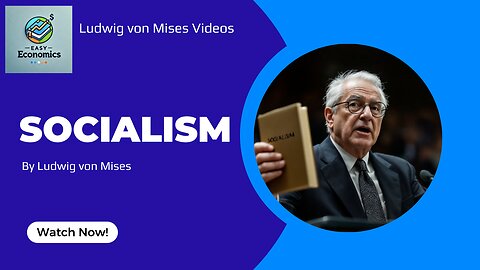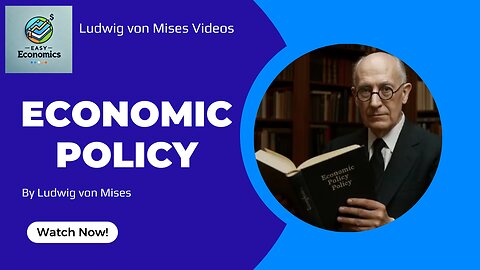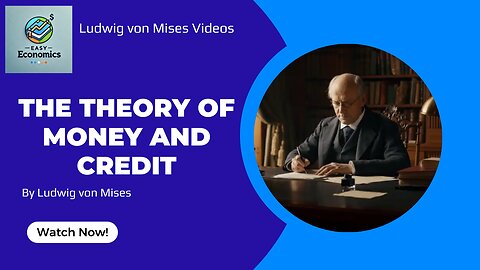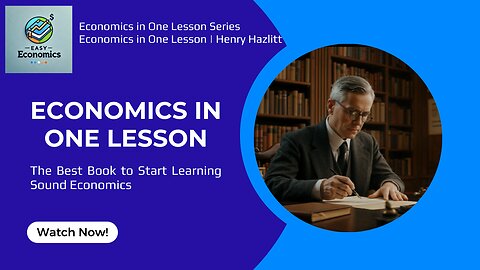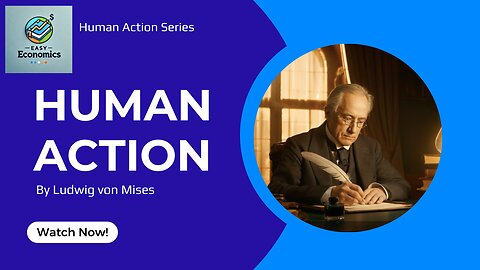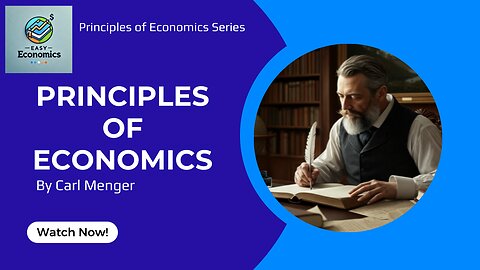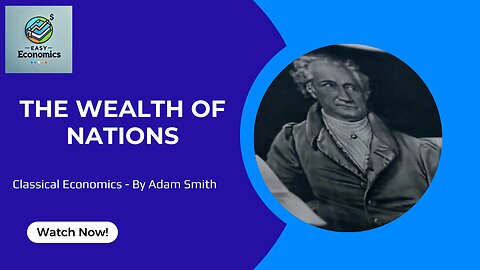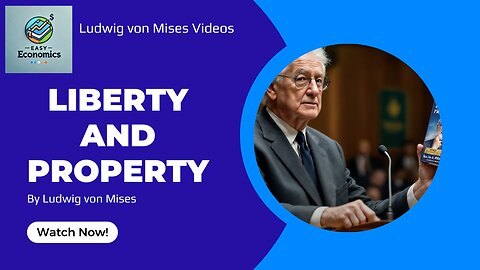
Must Read Economics Books
8 videos
Updated 11 months ago
Dive into the foundational ideas of economics with this curated playlist featuring the most influential books from Classical and Austrian economics. Explore the timeless principles of free markets, individual liberty, and the dynamics of supply and demand that shaped modern economic thought. From Adam Smith’s groundbreaking The Wealth of Nations to Ludwig von Mises’ profound Human Action, this playlist simplifies complex theories and highlights their relevance today. Perfect for students, enthusiasts, and anyone curious about how economies function at their core, these videos make economic classics easy to understand and engaging to learn.
-
Liberty and Property - Mises's Timeless Defense of Freedom and Property Rights
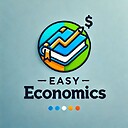 EasyEconomicsGet the book: https://amzn.to/4hes2TS Explore Ludwig von Mises' Liberty and Property (1927), a profound defense of individual freedom and private property as the cornerstones of a prosperous and just society. In this video, we examine Mises’ compelling argument that liberty allows individuals to make their own choices, while property rights incentivize innovation, investment, and economic progress. Mises critiques state intervention and collectivist ideologies, showing how central planning stifles market efficiency, erodes individual rights, and leads to stagnation. Discover how Mises connects the free market to liberty and property, arguing that voluntary exchanges benefit both individuals and society as a whole. This timeless work remains highly relevant in today’s debates about government control and market freedom. Whether you’re new to Austrian economics or a long-time advocate for free markets, Liberty and Property offers essential insights. Check the description to access this classic and dive deeper into Mises’ defense of freedom and prosperity! 00:00 - Introduction to Liberty and Property 00:08 - Overview of 'Liberty and Property’ 00:42 - Importance of Liberty and Property 02:25 - Dangers of State Control and Collectivism 03:46 - Role of the Market in Supporting Liberty and Property 05:03 - Conclusion7 views
EasyEconomicsGet the book: https://amzn.to/4hes2TS Explore Ludwig von Mises' Liberty and Property (1927), a profound defense of individual freedom and private property as the cornerstones of a prosperous and just society. In this video, we examine Mises’ compelling argument that liberty allows individuals to make their own choices, while property rights incentivize innovation, investment, and economic progress. Mises critiques state intervention and collectivist ideologies, showing how central planning stifles market efficiency, erodes individual rights, and leads to stagnation. Discover how Mises connects the free market to liberty and property, arguing that voluntary exchanges benefit both individuals and society as a whole. This timeless work remains highly relevant in today’s debates about government control and market freedom. Whether you’re new to Austrian economics or a long-time advocate for free markets, Liberty and Property offers essential insights. Check the description to access this classic and dive deeper into Mises’ defense of freedom and prosperity! 00:00 - Introduction to Liberty and Property 00:08 - Overview of 'Liberty and Property’ 00:42 - Importance of Liberty and Property 02:25 - Dangers of State Control and Collectivism 03:46 - Role of the Market in Supporting Liberty and Property 05:03 - Conclusion7 views -
Socialism - Ludwig von Mises Masterpiece Against Central Planning
 EasyEconomicsGet the book: https://amzn.to/40QZ1rL Discover Ludwig von Mises’ Socialism, one of the most comprehensive critiques of socialist systems ever written. Published in 1922, this groundbreaking work dissects the fundamental flaws of central planning and highlights the inefficiencies and dangers of government-controlled economies. At its core, Mises’ "economic calculation problem" reveals why socialism fails: without private property and market-driven prices, rational resource allocation becomes impossible, leading to inefficiency and stagnation. Mises also explores the moral and political consequences of socialism, warning of its impact on individual freedom and the rise of totalitarianism. Through historical examples and sharp economic analysis, Mises demonstrates how socialism undermines innovation, fosters dependency, and fails to deliver on its promises. Socialism is a timeless defense of free markets and individual liberty, offering insights that remain relevant in today’s debates on economic systems. Check the description to access this essential work and delve into Mises’ powerful arguments! 00:00 - Introduction of the book Socialism 00:07 - Overview of the Book's Significance 01:08 - The Economic Calculation Problem 02:32 - The Moral and Political Implications of Socialism 03:36 - The Impossibility of Socialism in Practice 04:34 - Conclusion20 views
EasyEconomicsGet the book: https://amzn.to/40QZ1rL Discover Ludwig von Mises’ Socialism, one of the most comprehensive critiques of socialist systems ever written. Published in 1922, this groundbreaking work dissects the fundamental flaws of central planning and highlights the inefficiencies and dangers of government-controlled economies. At its core, Mises’ "economic calculation problem" reveals why socialism fails: without private property and market-driven prices, rational resource allocation becomes impossible, leading to inefficiency and stagnation. Mises also explores the moral and political consequences of socialism, warning of its impact on individual freedom and the rise of totalitarianism. Through historical examples and sharp economic analysis, Mises demonstrates how socialism undermines innovation, fosters dependency, and fails to deliver on its promises. Socialism is a timeless defense of free markets and individual liberty, offering insights that remain relevant in today’s debates on economic systems. Check the description to access this essential work and delve into Mises’ powerful arguments! 00:00 - Introduction of the book Socialism 00:07 - Overview of the Book's Significance 01:08 - The Economic Calculation Problem 02:32 - The Moral and Political Implications of Socialism 03:36 - The Impossibility of Socialism in Practice 04:34 - Conclusion20 views -
Economic Policy - Ludwig von Mises's Guide to Market Freedom
 EasyEconomicsGet the book now: https://amzn.to/4gdvoVU Ludwig von Mises’ Economic Policy is a powerful defense of free markets and a critique of government intervention in the economy. In this video, we explore Mises’ key arguments, including his assertion that state interference distorts market signals, disrupts supply and demand, and leads to inefficiencies and unintended consequences. Discover why Mises championed economic freedom as the foundation for innovation, progress, and prosperity, while warning against the dangers of central planning, price controls, and subsidies. Learn how interventionism not only harms the economy but also undermines individual liberty and autonomy. Mises provides a clear framework for sound economic policy, emphasizing the importance of minimal government focused on property rights, the rule of law, and stable currency. Whether you’re new to Austrian economics or a seasoned enthusiast, this video highlights the timeless relevance of Mises’ insights. Check the description to access the original work and explore more resources! 00:00 - Economic Policy – Ludwig von Mises’ Guide to Government Intervention and Market Freedom 00:08 - Introduction to Ludwig von Mises' Economic Policy 01:14 - The Case for Market Freedom 02:38 - The Dangers of Interventionism 03:55 - Mises’ Vision for Sound Economic Policy 04:47 - Why Economic Policy is Essential Reading4 views 1 comment
EasyEconomicsGet the book now: https://amzn.to/4gdvoVU Ludwig von Mises’ Economic Policy is a powerful defense of free markets and a critique of government intervention in the economy. In this video, we explore Mises’ key arguments, including his assertion that state interference distorts market signals, disrupts supply and demand, and leads to inefficiencies and unintended consequences. Discover why Mises championed economic freedom as the foundation for innovation, progress, and prosperity, while warning against the dangers of central planning, price controls, and subsidies. Learn how interventionism not only harms the economy but also undermines individual liberty and autonomy. Mises provides a clear framework for sound economic policy, emphasizing the importance of minimal government focused on property rights, the rule of law, and stable currency. Whether you’re new to Austrian economics or a seasoned enthusiast, this video highlights the timeless relevance of Mises’ insights. Check the description to access the original work and explore more resources! 00:00 - Economic Policy – Ludwig von Mises’ Guide to Government Intervention and Market Freedom 00:08 - Introduction to Ludwig von Mises' Economic Policy 01:14 - The Case for Market Freedom 02:38 - The Dangers of Interventionism 03:55 - Mises’ Vision for Sound Economic Policy 04:47 - Why Economic Policy is Essential Reading4 views 1 comment -
The Theory of Money and Credit - Ludwig von Mises's Mastery of Monetary Economics
 EasyEconomicsGet the book now: https://amzn.to/4hmY53I Discover Ludwig von Mises’ groundbreaking insights in The Theory of Money and Credit, a cornerstone of Austrian economics published in 1912. In this video, we explore Mises’ analysis of money’s origins, its role in the economy, and its connection to credit, inflation, and economic cycles. Building on Carl Menger’s theories, Mises explains how money emerged from voluntary exchange, emphasizing its value as determined by market demand, not government decree. Delve into Mises’ critique of central banks and inflationary monetary policies, which he argues distort markets, create unsustainable booms, and lead to economic crises—a key concept in Austrian business cycle theory. Learn why Mises advocated for the gold standard to ensure economic stability and limit government interference. This essential work remains a vital resource for understanding the complexities of money, credit, and inflation in modern economies. Check the description for links to the original text and further resources! 00:00 - The Theory of Money and Credit – Ludwig von Mises' Mastery of Monetary Economics 00:08 - Introduction to The Theory of Money and Credit 01:03 - Origins and Nature of Money 02:05 - Money, Credit, and Inflation 03:07 - Role of Central Banks 04:00 - Why The Theory of Money and Credit is Essential Reading.20 views
EasyEconomicsGet the book now: https://amzn.to/4hmY53I Discover Ludwig von Mises’ groundbreaking insights in The Theory of Money and Credit, a cornerstone of Austrian economics published in 1912. In this video, we explore Mises’ analysis of money’s origins, its role in the economy, and its connection to credit, inflation, and economic cycles. Building on Carl Menger’s theories, Mises explains how money emerged from voluntary exchange, emphasizing its value as determined by market demand, not government decree. Delve into Mises’ critique of central banks and inflationary monetary policies, which he argues distort markets, create unsustainable booms, and lead to economic crises—a key concept in Austrian business cycle theory. Learn why Mises advocated for the gold standard to ensure economic stability and limit government interference. This essential work remains a vital resource for understanding the complexities of money, credit, and inflation in modern economies. Check the description for links to the original text and further resources! 00:00 - The Theory of Money and Credit – Ludwig von Mises' Mastery of Monetary Economics 00:08 - Introduction to The Theory of Money and Credit 01:03 - Origins and Nature of Money 02:05 - Money, Credit, and Inflation 03:07 - Role of Central Banks 04:00 - Why The Theory of Money and Credit is Essential Reading.20 views -
Economics in One Lesson - The Ultimate Book to Start Learning Sound Economics
 EasyEconomicsDo you want to start learning real economics and get the book ‘Economics in One Lesson’? Get it here: https://amzn.to/41WDZcb Discover the timeless wisdom of Henry Hazlitt’s Economics in One Lesson, a groundbreaking book that has shaped how we think about economic decisions since its publication in 1946. Hazlitt explains core principles like the “Broken Window Fallacy,” teaching us to look beyond immediate effects and consider the hidden, long-term consequences of economic actions. Explore key concepts like opportunity cost—the unseen trade-offs in every decision—and how market prices act as vital signals to allocate resources efficiently. Written in clear, accessible language, Economics in One Lesson simplifies complex ideas, making it an essential read for anyone curious about economics, from beginners to seasoned readers. In today’s world of increasing government intervention, Hazlitt’s defense of free markets and individual liberty is more relevant than ever. Watch this video to learn why Hazlitt’s lessons still resonate and how they can change the way you think about policies and the economy. 00:00 - Introduction to "Economics in One Lesson” 00:56 - The Broken Window Fallacy – Seeing the True Costs of Policy 02:16 - The Importance of Opportunity Cost – What You Give Up 03-09 - The Role of Prices and Markets in Allocating Resources 03:53 - Why "Economics in One Lesson" is Essential Reading16 views
EasyEconomicsDo you want to start learning real economics and get the book ‘Economics in One Lesson’? Get it here: https://amzn.to/41WDZcb Discover the timeless wisdom of Henry Hazlitt’s Economics in One Lesson, a groundbreaking book that has shaped how we think about economic decisions since its publication in 1946. Hazlitt explains core principles like the “Broken Window Fallacy,” teaching us to look beyond immediate effects and consider the hidden, long-term consequences of economic actions. Explore key concepts like opportunity cost—the unseen trade-offs in every decision—and how market prices act as vital signals to allocate resources efficiently. Written in clear, accessible language, Economics in One Lesson simplifies complex ideas, making it an essential read for anyone curious about economics, from beginners to seasoned readers. In today’s world of increasing government intervention, Hazlitt’s defense of free markets and individual liberty is more relevant than ever. Watch this video to learn why Hazlitt’s lessons still resonate and how they can change the way you think about policies and the economy. 00:00 - Introduction to "Economics in One Lesson” 00:56 - The Broken Window Fallacy – Seeing the True Costs of Policy 02:16 - The Importance of Opportunity Cost – What You Give Up 03-09 - The Role of Prices and Markets in Allocating Resources 03:53 - Why "Economics in One Lesson" is Essential Reading16 views -
Human Action - A Masterpiece of Economic Thought by Ludwig von Mises
 EasyEconomicsAre you interested to read the original book? Get ‘Human Action’ by Ludwig von Mises now: https://amzn.to/4fD9zP6 In this video, we explore Ludwig von Mises’ groundbreaking work Human Action—a masterpiece of economic thought from the Austrian School. Mises revolutionized how we understand economics by focusing on individual choices and subjective value rather than abstract systems. He demonstrated that free markets thrive because they reflect the decisions of millions, while centralized systems like socialism fail due to the lack of proper calculation and incentives. We’ll break down core concepts like the power of free markets, the economic calculation problem, and how individual decision-making drives innovation and prosperity. Mises also emphasized that economics is about more than money—it’s about freedom, morality, and human dignity. Whether you’re curious about markets or want to understand the forces shaping the world, this video simplifies Mises’ transformative ideas into bite-sized, easy-to-follow explanations. Join us to discover why Human Action remains essential for understanding both economics and humanity today. 00:00 - Introduction to Human Action 00:36 - Importance of 'Human Action' today 00:57 - Praxeology – Understanding Human Behavior 01:40 - The Power of Free Markets 02:32 - Economic Calculation and Why Socialism Fails 03:12 - Human Action and the Individual 03:46 - Why 'Human Action' is a Must-Read39 views 2 comments
EasyEconomicsAre you interested to read the original book? Get ‘Human Action’ by Ludwig von Mises now: https://amzn.to/4fD9zP6 In this video, we explore Ludwig von Mises’ groundbreaking work Human Action—a masterpiece of economic thought from the Austrian School. Mises revolutionized how we understand economics by focusing on individual choices and subjective value rather than abstract systems. He demonstrated that free markets thrive because they reflect the decisions of millions, while centralized systems like socialism fail due to the lack of proper calculation and incentives. We’ll break down core concepts like the power of free markets, the economic calculation problem, and how individual decision-making drives innovation and prosperity. Mises also emphasized that economics is about more than money—it’s about freedom, morality, and human dignity. Whether you’re curious about markets or want to understand the forces shaping the world, this video simplifies Mises’ transformative ideas into bite-sized, easy-to-follow explanations. Join us to discover why Human Action remains essential for understanding both economics and humanity today. 00:00 - Introduction to Human Action 00:36 - Importance of 'Human Action' today 00:57 - Praxeology – Understanding Human Behavior 01:40 - The Power of Free Markets 02:32 - Economic Calculation and Why Socialism Fails 03:12 - Human Action and the Individual 03:46 - Why 'Human Action' is a Must-Read39 views 2 comments -
Principles of Economics by Carl Menger - The Foundation of the Austrian School
 EasyEconomicsAre you interested to read the original book? Get ‘Principles of Economics’ by Carl Menger now: https://amzn.to/41Te3Ov In this video, we explore Carl Menger’s Principles of Economics, the foundational work of the Austrian School of Economics. Published in 1871, Menger revolutionized economic thought by shifting the focus from production costs to human decision-making. His key ideas, including subjective value and marginal utility, explain how value is determined by personal needs and preferences, not inherent properties. Menger demonstrated that as we consume more of something, its value decreases—this helps us understand why prices fluctuate based on scarcity. He also emphasized the role of individuals in shaping the economy, rather than abstract economic forces. Menger’s groundbreaking work continues to influence modern economics by highlighting the importance of entrepreneurship, choice, and time in economic decisions. Whether you're new to economics or curious about the Austrian School, this video breaks down Menger’s insights into easy-to-understand concepts that remain relevant today. 00:00 - Intro into Principles of Economics by Carl Menger 00:26 - Why Principles of Economics Matter Today 00:46 - Subjective Value – Why Things Are Worth What They’re Worth 01:20 - Marginal Utility – The Key to Understanding Choices 01:54 - The Role of Individuals in the Economy 02:31 - Why Principles of Economics is a Must-Read 02:57 - Conclusion and Further Resources32 views 1 comment
EasyEconomicsAre you interested to read the original book? Get ‘Principles of Economics’ by Carl Menger now: https://amzn.to/41Te3Ov In this video, we explore Carl Menger’s Principles of Economics, the foundational work of the Austrian School of Economics. Published in 1871, Menger revolutionized economic thought by shifting the focus from production costs to human decision-making. His key ideas, including subjective value and marginal utility, explain how value is determined by personal needs and preferences, not inherent properties. Menger demonstrated that as we consume more of something, its value decreases—this helps us understand why prices fluctuate based on scarcity. He also emphasized the role of individuals in shaping the economy, rather than abstract economic forces. Menger’s groundbreaking work continues to influence modern economics by highlighting the importance of entrepreneurship, choice, and time in economic decisions. Whether you're new to economics or curious about the Austrian School, this video breaks down Menger’s insights into easy-to-understand concepts that remain relevant today. 00:00 - Intro into Principles of Economics by Carl Menger 00:26 - Why Principles of Economics Matter Today 00:46 - Subjective Value – Why Things Are Worth What They’re Worth 01:20 - Marginal Utility – The Key to Understanding Choices 01:54 - The Role of Individuals in the Economy 02:31 - Why Principles of Economics is a Must-Read 02:57 - Conclusion and Further Resources32 views 1 comment -
The Wealth of Nations - A Timeless Guide to Prosperity
 EasyEconomicsWhy does a book from 1776 still matter today? The Wealth of Nations by Adam Smith is more than a classic—it’s a timeless guide to understanding how societies create prosperity. In this video, we break down Smith’s most influential ideas, like the invisible hand and the division of labor, into simple, easy-to-understand lessons. Smith showed that self-interest, when combined with free markets, naturally benefits everyone. A shoemaker working for profit still helps others by providing shoes. Meanwhile, specialization—focusing on what we do best—makes us more productive and wealthier as a society. These concepts remain at the heart of modern economics and explain why free markets thrive when individuals are free to trade and create value. Curious to learn more? Our video series makes Adam Smith’s ideas clear and relevant for today’s world. Get the original book: https://amzn.to/3W5xeku Learn about The Wealth of Nations on our website: https://easyeconomics.net/video-series-economics-books/the-wealth-of-nations/ Watch our video series about The Wealth of Nations by Adam Smith: https://rumble.com/playlists/bDlhDvvVL8Q Watch our video’s about other economics books: https://rumble.com/playlists/dJGTX0xbi6E Watch the next video in this series: https://rumble.com/v61f012-adam-smith-the-philosopher-who-changed-how-we-see-the-world.html 00:00 - Introduction to 'The Wealth of Nations’ 00:48 - The Invisible Hand – How Self-Interest Benefits Everyone 01:46 - Division of Labor – Why Specialization Makes Everyone Richer 02:33 - Why 'The Wealth of Nations' Matters Today24 views
EasyEconomicsWhy does a book from 1776 still matter today? The Wealth of Nations by Adam Smith is more than a classic—it’s a timeless guide to understanding how societies create prosperity. In this video, we break down Smith’s most influential ideas, like the invisible hand and the division of labor, into simple, easy-to-understand lessons. Smith showed that self-interest, when combined with free markets, naturally benefits everyone. A shoemaker working for profit still helps others by providing shoes. Meanwhile, specialization—focusing on what we do best—makes us more productive and wealthier as a society. These concepts remain at the heart of modern economics and explain why free markets thrive when individuals are free to trade and create value. Curious to learn more? Our video series makes Adam Smith’s ideas clear and relevant for today’s world. Get the original book: https://amzn.to/3W5xeku Learn about The Wealth of Nations on our website: https://easyeconomics.net/video-series-economics-books/the-wealth-of-nations/ Watch our video series about The Wealth of Nations by Adam Smith: https://rumble.com/playlists/bDlhDvvVL8Q Watch our video’s about other economics books: https://rumble.com/playlists/dJGTX0xbi6E Watch the next video in this series: https://rumble.com/v61f012-adam-smith-the-philosopher-who-changed-how-we-see-the-world.html 00:00 - Introduction to 'The Wealth of Nations’ 00:48 - The Invisible Hand – How Self-Interest Benefits Everyone 01:46 - Division of Labor – Why Specialization Makes Everyone Richer 02:33 - Why 'The Wealth of Nations' Matters Today24 views
